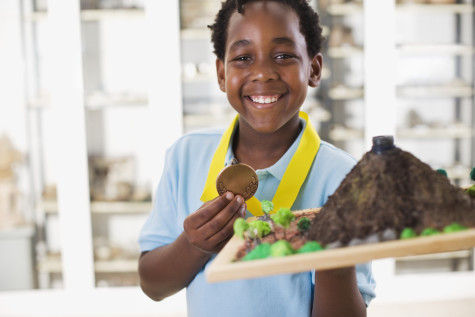 On twenty minutes’ notice, I was recruited as a judge for this year’s middle school science and heritage fair. The numbered displays were set up in rows in the gym, where model volcanoes smoked near replicas of Sir John Franklin’s ships. We judges chose score sheets affixed to a clipboard and roamed the aisles looking for our assigned children.
On twenty minutes’ notice, I was recruited as a judge for this year’s middle school science and heritage fair. The numbered displays were set up in rows in the gym, where model volcanoes smoked near replicas of Sir John Franklin’s ships. We judges chose score sheets affixed to a clipboard and roamed the aisles looking for our assigned children.
Some read haltingly from cue cards. Others looked us in the eye and lectured with confidence. One boy took me out to the playground to demonstrate his alcohol-fueled projectile weapon.
It’s a stereotype that science fairs are unfair because of the vastly different levels of parental involvement. That was certainly in evidence in my local science fair, but in the larger scheme I thought a lot of the kids might not otherwise have that quality time with their parents – the modern world has fewer opportunities for parent-child collaboration than previous generations’ work around the house would have entailed.
I remember my own middle school science project, decades ago, as rather uninspired. I sloshed about in my father’s dark room to create some colourful alterations to black and white photos I had taken of my piano keys. I don’t remember why. I probably memorized the chemical process – silver nitrate? – for my presentation, but I don’t remember it now. In short, if science fairs are the way some people spark to a career in science, it didn’t do the trick for me.
It’s hard to measure the impact of these events, but some studies have tried, quizzing students on their attitudes toward science and their understanding of the scientific method before and after their projects. One study found no particular benefits while another found better results when the project scores counted for school credit. Still another concluded that a series of smaller projects might take the pressure off and let kids associate science with something other than stress. Girls still tend toward biology and boys toward engineering.
In this year’s event, there were far fewer science projects than heritage projects – so few, in fact, that the organizers had decided next year to make science projects mandatory in grade seven and heritage projects in grade eight. The reason cited was that many homeroom teachers at that level are not particularly comfortable teaching science.
If this were true, I realized, my interaction with the students might be their only time spent in conversation with an adult who is clearly enthused about science. It could also be an opportunity to instill in them a faith that whatever their interests, someone else in the world will find them interesting as well. The students had spent just enough time on a subject that they had something to contribute to the discussion. I came away with the conviction that if we could isolate this element – members of the community talking shop with children – we could do away with the plaster of Paris sculptures and get something real done. The projects themselves, it turned out, are beside the point.
Image: Shutterstock
I’m proud to say that my 8th grade science fair project was growing bone inside a rabbit. I owe my stepdad a big thanks because he was doing orthopedic research at the time and involved me in his work. We created decalcified bone matrix and surgically implanted it into the animal as part 1 of my project. Then we removed it for part 2. I had the piece of bone there to show, and photos of me helping with the surgery. (The rabbit was fine, but I didn’t bring him to the fair.) Not surprisingly, I won first place. No plaster volcanoes here. It definitely got me excited about science.
I really enjoyed this, especially the last line – how the projects themselves are beside the point. I participated in the science fair every year when I was a kid (and won a few times!). As a grad student and now as a parent, I’ve judged the science fair almost every year. I’m always excited to see simple projects that the kids clearly took the lead in designing, carrying out, and analyzing. My opinion is that kids who are resourceful, creative and inquisitive are the clear winners — they’ve made something out of nothing and learned about the scientific process along the way. Shouldn’t elementary and middle school students focus on the fundamentals, rather than delving into advanced topics? I’m always disappointed to see a student win because their project was flashy enough to end up in a grad student’s thesis, when they may or may not have conceived it or even carried it out themselves. It feels wrong that kids who happen to have access to these resources can outcompete kids who are interested in science and do a great job despite having few resources. While the benefits of parent involvement are undeniable, it would be really great if parents with these resources came together and offered to “host” any student who might be interested in doing a lab-based science fair project. Maybe I’ll suggest that at my kids’ school. 😉 Thanks for writing!
That’s a really great idea, Anni. I could imagine having a pool of placements like that, which would be valuable for non-relatives. Thanks for the comment.